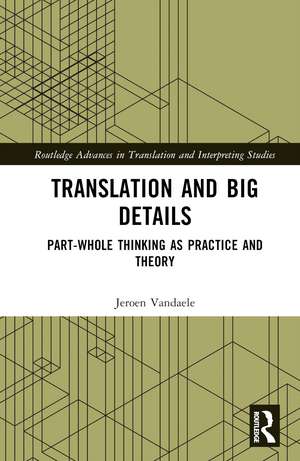Translation and Big Details: Part-Whole Thinking as Practice and Theory: Routledge Advances in Translation and Interpreting Studies
Autor Jeroen Vandaeleen Limba Engleză Hardback – 11 dec 2023
Din seria Routledge Advances in Translation and Interpreting Studies
-
 Preț: 302.36 lei
Preț: 302.36 lei - 9%
 Preț: 935.00 lei
Preț: 935.00 lei -
 Preț: 370.84 lei
Preț: 370.84 lei -
 Preț: 312.86 lei
Preț: 312.86 lei -
 Preț: 309.70 lei
Preț: 309.70 lei -
 Preț: 310.43 lei
Preț: 310.43 lei - 9%
 Preț: 933.86 lei
Preț: 933.86 lei -
 Preț: 311.76 lei
Preț: 311.76 lei -
 Preț: 386.54 lei
Preț: 386.54 lei -
 Preț: 326.49 lei
Preț: 326.49 lei -
 Preț: 310.60 lei
Preț: 310.60 lei -
 Preț: 311.41 lei
Preț: 311.41 lei -
 Preț: 311.22 lei
Preț: 311.22 lei -
 Preț: 384.74 lei
Preț: 384.74 lei -
 Preț: 310.25 lei
Preț: 310.25 lei -
 Preț: 640.25 lei
Preț: 640.25 lei -
 Preț: 469.34 lei
Preț: 469.34 lei - 12%
 Preț: 312.43 lei
Preț: 312.43 lei - 26%
 Preț: 762.97 lei
Preț: 762.97 lei - 26%
 Preț: 764.20 lei
Preț: 764.20 lei - 18%
 Preț: 1054.71 lei
Preț: 1054.71 lei - 18%
 Preț: 1080.71 lei
Preț: 1080.71 lei - 18%
 Preț: 1057.89 lei
Preț: 1057.89 lei - 12%
 Preț: 325.34 lei
Preț: 325.34 lei - 18%
 Preț: 1024.52 lei
Preț: 1024.52 lei -
 Preț: 449.41 lei
Preț: 449.41 lei - 18%
 Preț: 1109.99 lei
Preț: 1109.99 lei -
 Preț: 388.64 lei
Preț: 388.64 lei - 18%
 Preț: 1055.51 lei
Preț: 1055.51 lei - 26%
 Preț: 764.20 lei
Preț: 764.20 lei - 18%
 Preț: 998.71 lei
Preț: 998.71 lei - 18%
 Preț: 1000.27 lei
Preț: 1000.27 lei - 18%
 Preț: 1544.03 lei
Preț: 1544.03 lei -
 Preț: 431.18 lei
Preț: 431.18 lei - 13%
 Preț: 297.99 lei
Preț: 297.99 lei -
 Preț: 386.62 lei
Preț: 386.62 lei - 18%
 Preț: 1019.30 lei
Preț: 1019.30 lei - 25%
 Preț: 775.30 lei
Preț: 775.30 lei -
 Preț: 480.06 lei
Preț: 480.06 lei - 18%
 Preț: 1165.20 lei
Preț: 1165.20 lei - 18%
 Preț: 1108.37 lei
Preț: 1108.37 lei - 26%
 Preț: 764.20 lei
Preț: 764.20 lei - 26%
 Preț: 764.20 lei
Preț: 764.20 lei - 26%
 Preț: 764.20 lei
Preț: 764.20 lei
Preț: 1006.73 lei
Preț vechi: 1227.72 lei
-18% Nou
Puncte Express: 1510
Preț estimativ în valută:
192.66€ • 200.89$ • 160.12£
192.66€ • 200.89$ • 160.12£
Carte tipărită la comandă
Livrare economică 21 martie-04 aprilie
Preluare comenzi: 021 569.72.76
Specificații
ISBN-13: 9781032017693
ISBN-10: 1032017694
Pagini: 260
Ilustrații: 1 Tables, black and white; 8 Halftones, black and white; 8 Illustrations, black and white
Dimensiuni: 152 x 229 x 16 mm
Greutate: 0.64 kg
Ediția:1
Editura: Taylor & Francis
Colecția Routledge
Seria Routledge Advances in Translation and Interpreting Studies
Locul publicării:Oxford, United Kingdom
ISBN-10: 1032017694
Pagini: 260
Ilustrații: 1 Tables, black and white; 8 Halftones, black and white; 8 Illustrations, black and white
Dimensiuni: 152 x 229 x 16 mm
Greutate: 0.64 kg
Ediția:1
Editura: Taylor & Francis
Colecția Routledge
Seria Routledge Advances in Translation and Interpreting Studies
Locul publicării:Oxford, United Kingdom
Public țintă
PostgraduateCuprins
List of Illustrations
Prelude and Chapter Presentation
Chapter 1. Paradox: Translation’s Big Details
Chapter 2. Principle: How Details Grow Big
Chapter 3. Part-Whole Thinking (I): First Varieties
Chapter 4. Part-Whole Thinking (II): Phenomenal Varieties
Chapter 5. Part-Whole Thinking (III): Functional Varieties
Chapter 6. Politics: Shiftiness and the Social Whole
Chapter 7. Proof, Problems, and Paths: Concluding Thoughts
Index
Prelude and Chapter Presentation
Chapter 1. Paradox: Translation’s Big Details
Chapter 2. Principle: How Details Grow Big
Chapter 3. Part-Whole Thinking (I): First Varieties
Chapter 4. Part-Whole Thinking (II): Phenomenal Varieties
Chapter 5. Part-Whole Thinking (III): Functional Varieties
Chapter 6. Politics: Shiftiness and the Social Whole
Chapter 7. Proof, Problems, and Paths: Concluding Thoughts
Index
Notă biografică
Jeroen Vandaele teaches literary translation and Hispanic literatures at Ghent University, Belgium. From 2008 until 2017 he was professor of Spanish at the University of Oslo (Norway), teaching translation theory and cognitive poetics. He has been a scholar and teacher of translation since the late 1990s.
Recenzii
"Starting out from two basic concepts, ‘big details’ and ‘part-whole thinking’, Jeroen Vandaele succeeds in describing humanistic translation expertise as a blend of microtextual and cultural thinking, thus bringing scholars and practitioners of translation closer together. In times of artificial intelligence, this book shows translational detail to be a key to understanding human translation and translation studies. A rewarding read for experts and students alike."
- Belén Santana López, University of Salamanca, Spain; Spanish National Translation Prize 2019
"This insightful book invites us all to think about what translators do and how they do it. Translation changes things for many reasons and, as the author playfully shows us, the devil for translators is always in the detail."
- Susan Bassnett, University of Warwick and University of Glasgow, UK
- Belén Santana López, University of Salamanca, Spain; Spanish National Translation Prize 2019
"This insightful book invites us all to think about what translators do and how they do it. Translation changes things for many reasons and, as the author playfully shows us, the devil for translators is always in the detail."
- Susan Bassnett, University of Warwick and University of Glasgow, UK
Descriere
It theorizes connections between micro and macro analysis, between translation as detail and translation as culture, thus hoping to build bridges between humanistic translators and translation scholars. It acknowledges tensions between practice and theory and proposes a way forward
